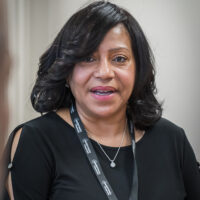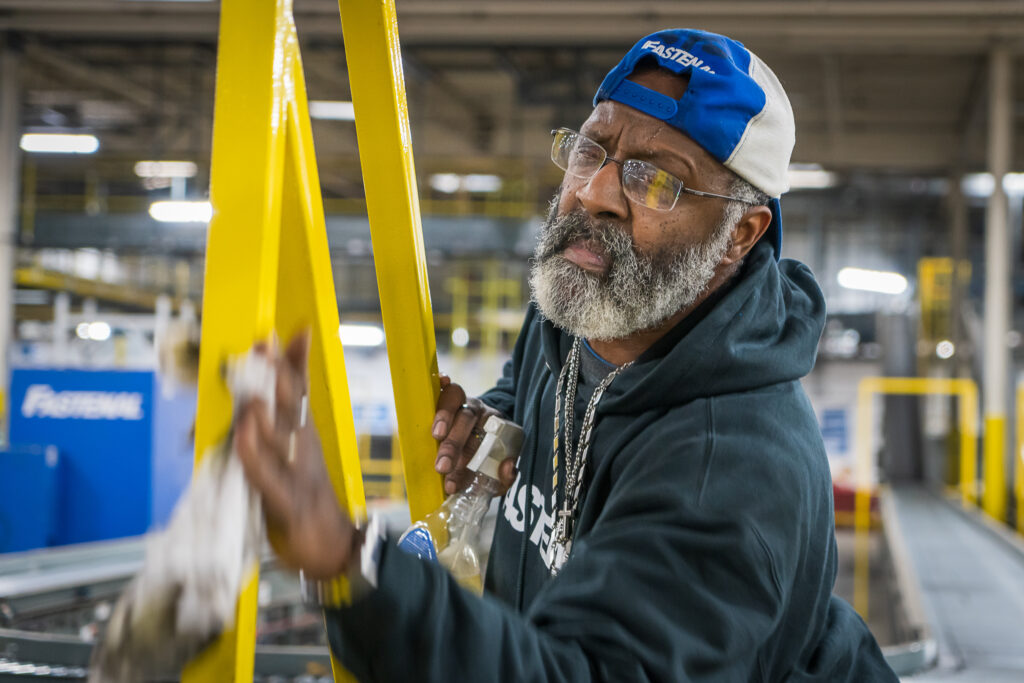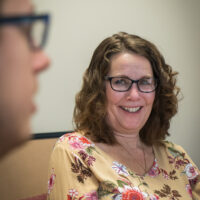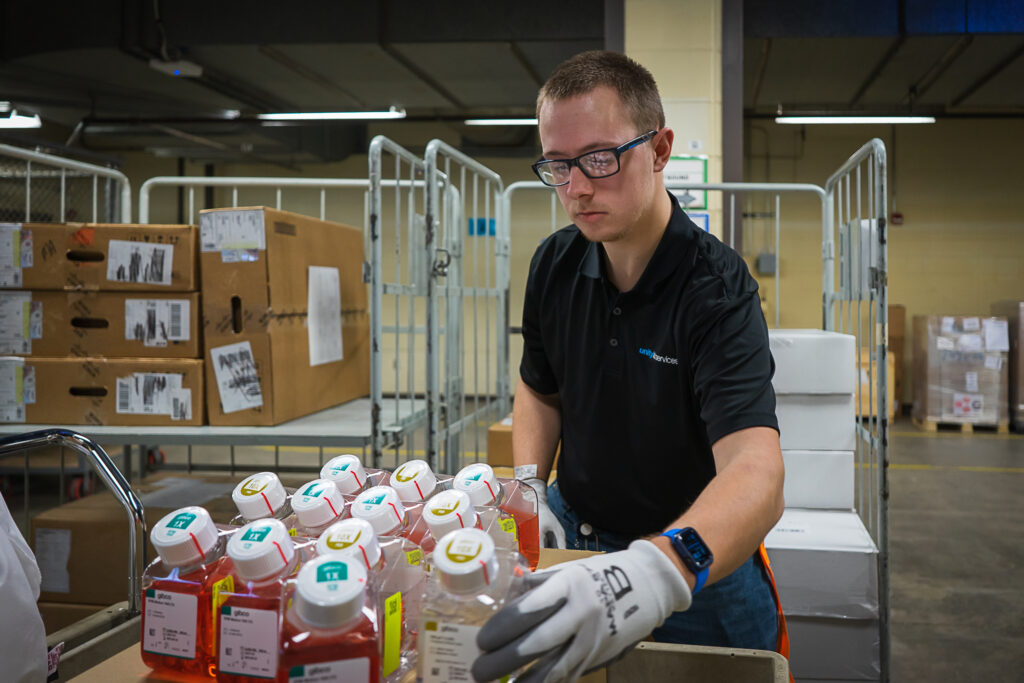2022 Annual Report:
Pathways to Opportunity offers clients support and mentoring to achieve financial and personal stability
For decades, there have been programs to help individuals with disabilities train for employment and find work. Among them were the job-training and placement efforts of Easterseals Crossroads.
But the central Indiana organization wanted to do more, especially for individuals living in or near poverty.
In 2020, the organization received a $50,000 planning grant through Lilly Endowment’s initiative, Enhancing Opportunity in Indianapolis. Funding helped Easterseals Crossroads find out what it needed to do to bring its clients facing financial instability out of poverty and to reach more individuals who need support but who were not yet connected to Easterseals Crossroads.
The organization concluded that it should develop a holistic program to address many aspects of the lives of individuals with disabilities—housing, food, mental health, family dynamics, legal issues, transportation, education and, of course, employment. Because without stability in those areas of life, a job only goes so far.
The result: Pathways to Opportunity, a program that provides intensive support, job training, mentoring and other services to individuals with disabilities living in Indianapolis. In 2021, Easterseals Crossroads received a $5 million grant from the Endowment to implement Pathways. Participants are residents of Indianapolis living at 185 percent of the federal poverty level. Their diagnosed disabilities are varied. Among them are developmental and cognitive disabilities, mobility issues, mental illness and chronic health conditions.
 “We knew we couldn’t just solve this problem by tweaking a solution that’s been in place for decades,” says David Dreith, Easterseals Crossroads President and CEO (left). “We had to break it down and start from the beginning.”
“We knew we couldn’t just solve this problem by tweaking a solution that’s been in place for decades,” says David Dreith, Easterseals Crossroads President and CEO (left). “We had to break it down and start from the beginning.”
Planning sessions sharpen understanding of challenges
During a four-month planning period, the leadership team convened brainstorming sessions. Staff in employment services, veterans’ services, and autism and behavior services gathered to get a broader understanding of the needs and challenges faced by the individuals they serve. They surveyed clients and conducted a focus group to learn about the specific barriers to employment and financial security. The feedback was clear: individuals struggle with transportation, childcare, and adequate job skills and other training. Overall, too many lack a support system that could help them make strides toward achieving lasting financial security.
“Having that period to plan really did help us to hone our proposal,” Dreith says. “Lilly Endowment recognized the importance of planning and said, ‘You’re going to learn from the planning process and you may deviate from your original plan. We want to support your learning.’ ”
In the new program developed by Easterseals Crossroads, each client is assigned a career navigator who guides them through every step of obtaining essential resources, including finding a job with a living wage. In Indianapolis in 2020 that meant earning $18 an hour and benefits.
 The Pathways program is now in its second year, and Dreith says it’s been successful in part because the Endowment grant enabled Easterseals Crossroads to plan. The organization developed a program model and strategies; hired program manager Karen Causey (right), who has a long history of working with individuals with disabilities; and connected with other community organizations to see what services already existed.
The Pathways program is now in its second year, and Dreith says it’s been successful in part because the Endowment grant enabled Easterseals Crossroads to plan. The organization developed a program model and strategies; hired program manager Karen Causey (right), who has a long history of working with individuals with disabilities; and connected with other community organizations to see what services already existed.
Circles Indy is one of roughly a dozen community organizations that Easterseals Crossroads is connecting with for the Pathways program. Dedicated to helping individuals and families who are living in poverty, Circles Indy provides Pathways clients with a 14-week training called Getting Ahead, which teaches self-sufficiency skills and provides them with a “circle of support.”
“We have a two-way relationship with our partners,’’ Causey says. “We refer participants to their programs that have already been developed and are successful and they refer participants to our program when our services better meet their participants’ needs. Our program is high touch and very comprehensive.”
Easterseals Crossroads works with clients to determine which resources they need by identifying the barriers they face and their level of self-sufficiency. Staff members also perform career assessments to figure out program participants’ aptitudes and interests. Then, they develop step-by-step plans for success. The message? ‘If you do all these things, your chances to become self-sufficient are much higher.’ Referrals to other resources and programs often are put in place to help make the plans come to fruition.
In late 2021, Easterseals Crossroads began enrolling participants in the Pathways program with the goal to lift 150 Marion County residents with disabilities out of poverty by the end of 2026.
“It’s not high volume,” Causey says, “but it’s high intensity.”
One-on-one attention helps client focus on goals
One of the first-year clients is Cyrus Nickolas Sutherlin (below), 56 years old. Diagnosed with post-traumatic stress disorder, he had spent six years in the U.S. Army and more time than that in prison. When he entered the Pathways program in spring 2022, Sutherlin had a job at a car wash with little prospect for advancement. He was living with his father but needed to find his own place. Among his needs, aside from a more stable job and a place to live, were mental-health services to help him with anger and depression issues; financial literacy training to keep him from spending every dollar he earned; and legal assistance to help expunge some of the charges on his record.

“It’s time to grow up now,” Sutherlin says, tearing up as he tells his story. “It’s time to stop that childish behavior.”
Bill Stetzel is Sutherlin’s career navigator. He’s also the business liaison for the Pathways program, developing relationships with companies to help people get jobs and become successful employees. In the first eight months since Sutherlin joined Pathways, he received:
- Financial aid to afford the $1,500 upfront cost for rent he needed to move into his own place. “I’ve come this far from nothing,” he says. “Now I’ve got a little something … I’ve got a key that is my own.”
- Help with his resume and with how to handle a job interview, including how to talk about his criminal history.
- Counseling from Eskenazi Health Midtown Community Mental Health, where he is learning to respond constructively to stressful situations.
- Financial literacy education so he can better manage money. Sutherlin pulls out his phone and proudly shows the balance in his savings account.
- Job placement. Sutherlin works in janitorial services/maintenance for $17 an hour at Fastenal, a distributor of industrial and construction products.
As 2022 ended, Sutherlin had goals. He was working toward earning a raise so he could afford to move closer to work (his commute is two hours each way); continuing to learn to better handle stress and emotional ups and downs; striving to become Fastenal’s employee of the year; and developing computer competencies and soft skills so he can advance in the workforce.
 “We’re trying to put Cyrus—and everyone we’re working with—on a path to independence and self-sufficiency,” says Marjorie Duryea, director of employment programs for Easterseals Crossroads (left). “Long after we’re done, when Cyrus has a problem on a job, we want him to know how to handle it.”
“We’re trying to put Cyrus—and everyone we’re working with—on a path to independence and self-sufficiency,” says Marjorie Duryea, director of employment programs for Easterseals Crossroads (left). “Long after we’re done, when Cyrus has a problem on a job, we want him to know how to handle it.”
“Sometimes, you gotta do what you don’t want to do to get where you’re trying to go,” Sutherlin says. “I do the best I can every day. Mr. Bill, Miss Karen—they’ve been helping me really intentionally. I appreciate that. They went out of their doggone way to help me. I help myself, but I still slip up.”
Long-term goals include financial independence and self-sufficiency
Sam Melvin (below), at 24 years of age, is another Pathways client finding success. When he joined the program, he was out of work and needed safe housing, financial literacy training and a meaningful job where he could advance.
Melvin lives with autism. He needed help to succeed on the job. Causey, who is serving as his career navigator, worked with Melvin so he could become more comfortable with interviewing. She also helped him understand the skills he needs for employment success. Stetzel helped Melvin land an interview with Thermo Fisher Scientific, a company that provides goods and services to organizations working to cure cancer, protect the environment and ensure food safety.

Melvin got the job. He’s an inventory specialist, earning $17 an hour to start, with a pathway to $18.
With the job in place, housing was the next goal—he was living with his mother at the time and looking to get his own apartment—along with mental-health services. The Pathways program connected him with Adult & Child Health in Indianapolis for counseling. He also is learning financial literacy after racking up credit card debt buying, among other things, video games.
Causey also recommended Circles Indy, where Melvin will connect with an ally who will provide personal and professional mentoring. When he experiences stress or a stumble, the ally is someone to call.
Melvin says his long-term goal is “to stabilize myself. It’s all about financial management and keeping everything together.”
Causey says her long-term goal for Pathways to Opportunity “is to have someone complete the program and later be hired for a career navigator position. What better source to help someone navigate than someone who has experienced being successfully navigated.”
Enhancing Opportunity in Indianapolis is a Lilly Endowment initiative designed to help individuals and families facing complex and varied challenges associated with poverty make progress toward lasting economic self-sufficiency. In 2020, the Endowment awarded planning grants to 33 organizations. In 2021, the Endowment awarded implementation grants to 28 organizations.